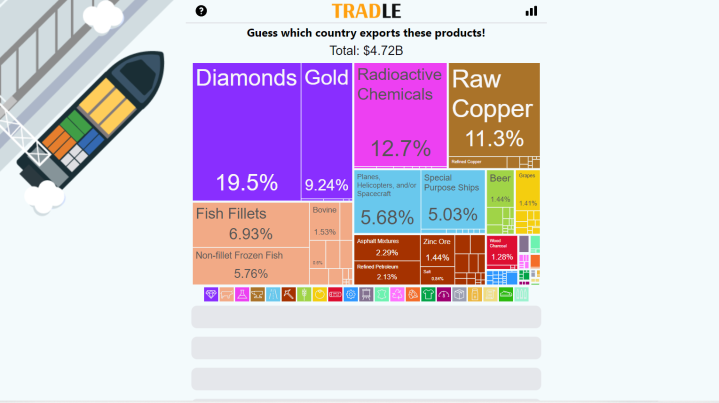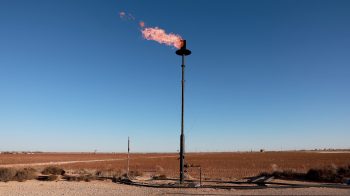
Tradle brings Wordle-style game to global exports

For most of us, Wordle, The New York Times’ five-letter-word guessing game that exploded in popularity during the pandemic, is old news. (Unless you never broke your streak, that is.)
But how about a spinoff that is right up Marketplace’s alley? Tradle is a Wordle-style game from the Observatory of Economic Complexity. And instead of a word, players guess a country based on its exports and the size of its economy.
Gilberto García-Vazquez is chief economist at Datawheel, the company behind the OEC and Tradle. He joined Marketplace’s Kai Ryssdal to talk about how the game got its start and what it can tell players about economic complexity. An edited transcript of their conversation is below.
Kai Ryssdal: So let me ask you first of all, have you played today’s game yet?
Gilberto García-Vazquez: I haven’t. I was waiting for you.
Ryssdal: I appreciate you waiting. All right. Do you have it up in front of you? OK, so I’m just gonna say 19.5% of this country’s $4 billion in exports being diamonds seems to be a giveaway.
García-Vazquez: Right. You have a big clue there.
Ryssdal: All right, a big clue. I’m gonna go ahead and enter “South Africa” here as my first guess and … wow. OK, so South Africa is not the right answer. So the way this works is that you make your guess, it tells you how far off in kilometers you are, and then it gives you a compass direction to think about for your second guess. So I should move to the northwest 954 kilometers, give or take 500 miles. Despite my producer’s recommendation, I do not have a world map in front of me. So what’s your guess? You’re the trade expert.
García-Vazquez: It’s on the coast, right? Because you see fish there.
Ryssdal: Oh, wait. Oh, yeah. Oh, wait, sorry. Wait, wait, wait, wait, this is great. I totally missed this. Fish fillets are 6.93% of this country’s exports. Non-filleted frozen fish are 5.76%. Yeah, you’re totally right.
García-Vazquez: Well, we should try … what about Namibia?
Ryssdal: Namibia? All right. I’ll give it a try. Boom. There we go, Namibia. We got it. We got it in two, which is to say, you got it in two. Well, first of all, thank you for helping me out. Second of all, since we want to do more than just play this game, you get now, I think, on average, half a million views a month on this — please take no offense — this sort of geeky, dorky trade game. And I guess I wonder what you think the draw is. I mean, I know why I’m interested. I guess there’s a bunch of people out there like you and me.
García-Vazquez: Yeah, no, absolutely. We were very surprised by the response. We launched this in March 2022. That was a tricky time for world trade just after the Russian invasion of Ukraine. So people were paying more attention to world trade. And I think the level of response is right now higher than what you quoted. We’re close to a million visits a month. It’s just a reflection of how people are paying attention to that. And we’re more conscious about how the world is connected and how world events come close to home. They affect you in every way.
Ryssdal: Is this the first version of the game? Did you pop this thing out and this was the version, or did you have to try a couple before you really got the popular version that we see today?
García-Vazquez: Yeah, no we put it out very quickly. But then, at some point, we run out of countries, right? We do have only 224 countries with trade data.
Ryssdal: That’s kind of limited. That’s true.
García-Vazquez: So we thought we were very smart. We said, “OK, we also have the OEC data from some national entities like states in the U.S. or provinces in China or prefectures in Japan.” And then we tried to do it about those, but players didn’t like it.
Ryssdal: Yeah, it’s because it’s hard. That’s why.
García-Vazquez: It is hard. I mean, we have Texas, California — things like that. A lot of people picked Alaska very quickly. But if you’re far, that’s maybe too specific.
Ryssdal: Now, this is specifically exports. Did you all think of, sort of, other metrics? Did you think, like, imports, or — I don’t even know what else it might be, but there are definitely different ways to slice global trade data.
García-Vazquez: Yes, definitely. We have thought about imports. And it’s more challenging, right? Because we can all think about what different places produce and they’re famous for. For example, one of the countries that was more easily identified was Fiji. And this is because almost 40% of exports is water, so people can identify very quickly with Fiji water. But then when you’re talking about imports, it is very difficult, right? Because, for example, a small island can be importing everything, but also a medium-sized country that needs those imports to produce. So we’re thinking about the imports, but we’re trying to do it in a way that is still challenging, but still rewarding if you get it right.
Ryssdal: Well, yeah. I mean, you heard my excitement when we — by which I mean you — got today’s right. We should say, and I’m just gonna pull back the fourth wall here, that we tried to do this yesterday. We had some technical problems, so we couldn’t, but yesterday’s Tradle was ridiculously difficult. It was a tiny, little country with $7 million in exports. Seven million with an “M” and exports of which, like, 10% were mollusks. And let’s just say I did not get it, even with my sixth guess. [Note: The answer was Turks and Caicos.]
García-Vazquez: Me neither. You’re not alone in that. Normally two-thirds of games end on a win, but yeah, sometimes the case is where very few players get it right. Yesterday it was really difficult.
There’s a lot happening in the world. Through it all, Marketplace is here for you.
You rely on Marketplace to break down the world’s events and tell you how it affects you in a fact-based, approachable way. We rely on your financial support to keep making that possible.
Your donation today powers the independent journalism that you rely on. For just $5/month, you can help sustain Marketplace so we can keep reporting on the things that matter to you.

















